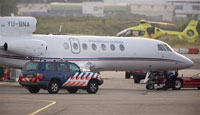Radovan Karadzic transferred to UN prison cell
The U.N. war crimes prosecutor for the former Yugoslavia says Serbia authorities "deserve full credit" for arresting longtime fugitive Radovan Karadzic.

Serge Brammertz also says it will take months before the prosecution and defense are ready for the trial of the former Bosnian Serb leader.
Karadzic was arrested last week in Belgrade after 13 years at large and taken into U.N. custody on Wednesday.
Brammertz said he hopes Serb authorities will soon arrest Karadzic's former military chief, Gen. Ratko Mladic.
The prosecutor says he plans to visit Belgrade in September for his first meeting with Serbia 's new pro-Western government to discuss further cooperation.
Former Bosnian Serb leader Radovan Karadzic was transferred to a U.N. jail cell and will face a judge Thursday - the first step of his trial on charges of waging genocide against non-Serbs during the Balkan wars of the 1990s.
His arrival early Wednesday in the Netherlands marked the end of a 13-year effort by the Yugoslav war crimes tribunal to take custody of its most wanted war criminal, accused of responsibility for the deaths of tens of thousands of people and the sufferings of hundreds of thousands of Bosnian Muslims and Croats.
Tribunal spokeswoman Nerma Jelacic, confirming his arrival at the U.N. detention center outside The Hague, said the tribunal will "ensure his well being and right to a fair trial as much as possible and in accordance with the highest international standards."
Karadzic was flown in overnight on a Serbian government business jet from Belgrade. The tribunal declined to give details of the transfer, citing security in future cases. But the confirmation came shortly after a helicopter landed behind the high wall of the jail while another helicopter hovered overhead. Two black minivans drove through the prison gates moments earlier.
The court announced that Karadzic will be summoned before a judge Thursday afternoon and asked to enter a plea on each of 11 counts, including genocide, extermination and persecution.
Still, it is likely to be several months before his trial begins, and could take several years before it concludes.
In Belgrade, Karadzic's lawyer Sveta Vujacic said his client will postpone entering a formal plea for 30 days, the maximum allowed under court rules.
Vujacic also acknowledged he never filed an appeal against Karadzic's extradition from Serbia, and said the dayslong uncertainty over the appeal helped stall Karadzic's handover.
Chief prosecutor Serge Brammertz scheduled a news conference for later Wednesday.
Legal experts consider Karadzic the most important figure in the war crimes committed in Bosnia , exceeding the role played by the late Yugoslav President Slobodan Milosevic, whose own trial ended inconclusively when he died in 2006 in the same U.N. jail.
Karadzic's top commander, Ratko Mladic, also accused of genocide, remains at large.
Prosecutors allege Karadzic masterminded atrocities including the 1995 massacre of 8,000 Muslim men and boys in the Bosnian town of Srebrenica, the deadly siege of Sarajevo, and the detention of tens of thousands of people in 20 concentration camps where many were tortured, starved and sexually abused.
Serbian authorities say they arrested Karadzic July 21 in Belgrade , where he had been living under a false identity and practicing alternative medicine.
Hours before he left Belgrade, about 15,000 Serb extremists rallied in a main square in the Serb capital demanding a halt to the extradition. Several hundred hooligans separated from the group and hurled stones and burning flares at riot police.
Later, police fired tear gas and rubber bullets at large groups of demonstrators, trying to push them away from the square as the rally ended. Nationalist organizers had predicted a much larger turnout.
Belgrade's emergency clinic reported that 46 people were injured, including 25 policemen and 21 civilians.
Until his arrest, Karadzic had been living in an outlying Belgrade suburb under the name of Dragan Dabic. His bouffant mane of salt and pepper hair - his trademark during the Bosnian war - had gone, replaced by flowing white hair and a beard that drew comparisons with Santa Claus and the Russian mystic Rasputin.
Since his capture, Karadzic has gotten a shave and a haircut. His lawyer says he looks like an older version of the Bosnian Serb leader who regularly met with top Western officials, diplomats and military commanders during the 1992-95 Bosnian war.
During the war he was known as the urbane, intellectual face of a monstrous regime blamed for the worst atrocities in Europe since World War II.
Prosecutors allege that the one-time psychiatrist and poet transformed himself into an ultranationalist Serb warlord before and during the war.
According to his indictment, Karadzic and other senior Bosnian Serb leaders unleashed a reign of terror that began with vicious campaigns of ethnic cleansing to drive Muslims and Croats out of land he considered part of a "Greater Serbia." The terror reached its bloody climax in the slaughter at Srebrenica.
Subscribe to Pravda.Ru Telegram channel, Facebook, RSS!




